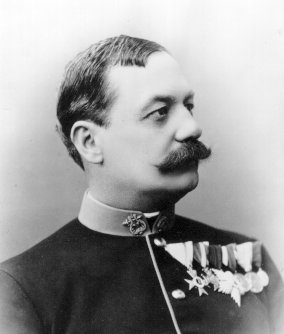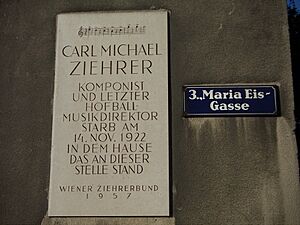Carl Michael Ziehrer facts for kids
Carl Michael Ziehrer (born May 2, 1843 – died November 14, 1922) was a famous Austrian composer. He was a big rival of the well-known Strauss family, especially Johann Strauss II and Eduard Strauss.
Contents
Biography
Early Musical Journey
Carl Michael Ziehrer was born in Vienna, Austria. He learned music from two important teachers, Simon Sechter and Johann Emanuel Hasel. A music publisher named Carl Haslinger soon noticed his talent. Haslinger wanted to find a new composer to compete with the famous Strauss family.
On November 21, 1863, young Ziehrer led a new orchestra for the first time. Their goal was to become more popular than the Strauss family's music. Soon after, he joined a military band in Vienna. In 1873, he became the leader, or Kapellmeister, of a large orchestra. He also started a music magazine called "Deutsche Musikzeitung." This magazine was an important way to study music in the late 1870s.
Tours and New Beginnings
After starting his music magazine, Ziehrer changed publishers. He then traveled a lot, touring Eastern Europe and Germany. People knew him as a strict but very good conductor. In 1881, while in Berlin, he met Marianne Edelmann. She was a famous singer of operettas, which are like light, fun operas. She later became his wife.
Growing Fame and Challenges
Between 1885 and 1893, Ziehrer continued to tour widely. He also led military bands, including the famous "Deutschmeister" band. His music became so popular that he was asked to perform at the World's Fair in Chicago in 1893. After that, he toured 41 cities in Germany.
He then returned to Vienna and started an even bigger orchestra. This orchestra was very successful and played a lot of dance music. His songs like "Weaner Mad’ln" and "Wiener Bürger" became very popular. "Wiener Bürger" even became more liked than some Strauss songs when it first came out in 1890.
Focus on Composing
Even though Ziehrer was a strong rival, he never fully became more famous than the Strauss family. He even looked a bit like them, with a similar moustache and hairstyle. As the 1900s began, Ziehrer wanted to spend more time writing music. He slowly stopped leading military bands, leaving his last position in 1899. This was the same year Johann Strauss II died.
Ziehrer also found success writing operettas. His stage shows like Die Landstreicher in 1899 were well-liked. He was important because he connected the older "Golden Age" of operetta with the newer "Silver Age." This new style included composers like Franz Lehár.
In 1909, Ziehrer received a special honor. He was named the 'KK Hofballmusikdirektor'. This important job was first given to Johann Strauss I many years before. Johann Strauss II and Eduard Strauss also held this position. Ziehrer was the last person to have this title. It ended when the House of Habsburg royal family lost power after World War I. Before the war, he worked well with other composers like Franz Lehár and Oscar Straus. He often led their concerts as a guest conductor.
Later Life and Legacy
When World War I started, it greatly affected Ziehrer's music career. Much of his property was destroyed. He passed away on November 14, 1922, in Vienna. He was buried in the Zentralfriedhof, a famous cemetery, next to his wife.
While his musical fame might not be as big as the Strauss family's, Ziehrer wrote a lot of music. He composed over 600 waltzes, polkas, and marches. Many of these are still played today. Some people even say his music sounds more "Viennese" than the Strauss family's. His songs are lively and strong, with happy tunes, even those written near the end of the Habsburg era.
In 1945, a movie called Viennese Girls was made about Ziehrer's life. The actor Willi Forst played him and also directed the film.
Works
- List of dances and marches by Carl Michael Ziehrer
- List of operettas by Carl Michael Ziehrer
See also
- Peter Zauner (composer)
- In Spanish: Carl Michael Ziehrer para niños
 | Emma Amos |
 | Edward Mitchell Bannister |
 | Larry D. Alexander |
 | Ernie Barnes |



